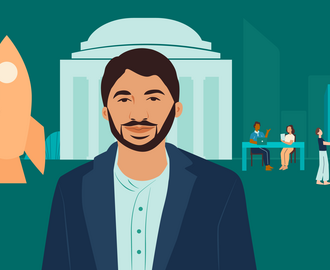Josie Liu, MBA '21
A native of Melbourne, Australia, Josie Liu is a born explorer. Starting her journey with a background in strategy consulting, Josie shifted gears to follow her passion—marrying innovation and inclusion —and learn how to leverage it on a larger scale. As one of the co-directors of the MIT Sloan Hack for Inclusion hackathon, Josie honed her leadership and teamwork skills while embracing her interest in diversity, equity, and inclusion.
Tell me about your background and previous work experience before coming to MIT Sloan?
Coming out of my undergrad, I started a home cleaning company called Jarvis with a few friends. It was definitely exciting to be super hands-on and bring an idea to life, but I encountered a lot of the same challenges that young founders, especially women, face like doubting myself and others doubting me. At that point, I wanted to pursue a job that would improve my business confidence and technical skills. After consulting for a few years in Australia and then in Boston, I discovered what was missing: I had no real sense of what I was passionate about or what I wanted to contribute on a larger scale. Business school was an appealing way to explore those questions, and I’m glad that I had the opportunity at Sloan.
What made you want to get an MBA from MIT Sloan?
I loved the idea of how much flexibility there was at Sloan. The biggest thing that I wanted to get out of business school was exploring different ideas. Beyond taking a one-semester Core and exploring different tracks and certificates, I also was able to cross-register at other schools across MIT and expand my network.
I also wanted to explore things that were outside of my core competency—and of course there was the allure of all the innovation that’s happening at Sloan! Coming from an entrepreneurship background, it’s pretty exciting to be around everybody else who either was or wanted to be a founder. There’s something really special about that, and I was inspired to be around others with that mindset.
You were part of the organizing team for Hack for Inclusion 2021. Could you briefly explain what that initiative is about?
Hack for Inclusion is a hackathon that is focused on diversity, equity, and inclusion. Hackathons at their core are a very MIT thing. While DEI issues are big, far-reaching, and even systemic, they’re also surprisingly fixable if we invest the right resources and apply a hacking mindset in our efforts.
In the Hack for Inclusion, we try to make those challenges and solutions tangible by partnering with sponsor organizations. We set out the problem, provide some background information, and then recruit hackers. Last year, we had a record-breaking 300 hackers! At the end, we had them pitch their solutions and then we handed out prize money for the top solutions.
Could you talk a little bit more about your role as part of the organizing team?
I was one of four co-directors who were focused on the Hack for Inclusion/Sloan for Inclusion group. I took the lead on getting sponsorships, laying out the challenge statements, and then marketing and ticketing. The biggest part of that role is working with the planning team. We had an incredibly excited group of first- and second-year MBAs as well as some folks from other programs, including IDM program participants who specialized in design thinking. It was great to have their expertise on-board.
Which challenges did you participate in, and what made you want to explore them?
There were two challenges that stood out for me. The one with Toast was about how we support and empower restaurants that are operated by people of color. Especially coming out of COVID-19, we’ve seen the disproportionate impact on black-run and minority-owned businesses. What really struck me about the teams who worked on that challenge was how focused they were on getting to the root causes and how they came out with lots of different, thoughtful answers.
The other one that I liked was Catalyst, a nonprofit organization. Their challenge was all about making virtual workshops more accessible for folks with disabilities. It really drilled home this idea that disability is not an issue of somebody with a disability. It’s about whether the area of space that they’re in or the activity they’re engaged in is accessible. One participant came up with a comprehensive playbook that Catalyst is super excited to implement. That’s the hacking mindset at its best.
As a member of the organizing team for Hack for Inclusion, DEI is clearly important to you. Can you speak more on that aspect of planning?
The whole experience was so transformative for me. When I got involved with the planning team, I wasn’t intending to take on a leadership role. I’ve never seen myself as being qualified to be a DEI champion. But even at Sloan over the last 12 months, so much has happened: the unequal impacts of COVID-19, a racial reckoning, and violence against Asian Americans.
I think a lot of us have been raised to feel uncomfortable talking about these issues. And so, having that leadership role in Hack for Inclusion has pushed me to step up and say something about it. It’s also important to make space for other people to grow, and for us to educate ourselves, whether it’s as allies in a particular issue or as the folks who are being directly affected.
What are some of the other DEI initiatives you’ve taken part in while at Sloan?
During the resurgence of the Black Lives Matter movement, I was involved in pulling together some informal programming. We held a couple of sessions on allyship and identity and started an informal book club that ended up growing to 60 Sloanies.
The morning after the Atlanta shootings, a community space was launched.And so, it seemed to me it would be a pretty low-effort activity to say, “Hey, here’s my Zoom link. I’m going to be on it for a couple of hours tonight if you want to join me.” I was super honored to have not only Asian students, but also a lot of allies come and join those who were willing to just be there and listen. I was moved by what everyone was willing to share, and that sparked conversations between others as well.But these are just small steps. I’ve learned that it’s okay to feel uncomfortable so long as I keep pushing myself, embracing what we call “the growth mindset”—being willing to admit that I’m wrong and could do things better the next time. I’m accepting that feeling of “comfort with discomfort,” knowing that responsibility to do the right thing overshadows it.
What is your advice for anyone pursuing an MBA?
Embrace the opportunities that come up. There’s never been an instance where I’ve regretted being involved or when I’ve come away from any of these experiences not learning something about myself, whether it’s tactical communication skills, working with sponsors, moderating a conversation, or exploring my personal interests.
The other big takeaway for me is that there’s a lot of exciting opportunities at the intersections of my interests—and the magic is where they collide. I’m excited about sustainability and transport, especially around urban planning, and I’ve taken a few classes outside of Sloan in that space. I’ve also been cultivating my passion for DEI, and pushing myself to take on more of a leadership role.
By marrying those two different interests, I can see just how much they overlap—and how many opportunities there are to grow my understanding beyond Sloan.
Register your interest to learn more about the MIT Sloan MBA program



